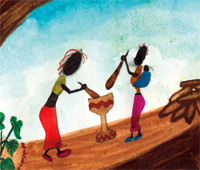Who we are & History
Who we are
 Created by the Consultative Group on International Agricultural Research (CGIAR) in 2003 as a time-bound 10-year Programme, the mission of the CGIAR Generation Challenge Programme (GCP) is to use genetic diversity and advanced plant science to improve crops by adding value to breeding for drought-prone and harsh environments. This is achieved through a network of more than 200 partners drawn from CGIAR Centres, academia, regional and national research programmes, and capacity enhancement to assist developing-world researchers to access technologies and to tap into a broader and richer pool of plant genetic diversity.
Created by the Consultative Group on International Agricultural Research (CGIAR) in 2003 as a time-bound 10-year Programme, the mission of the CGIAR Generation Challenge Programme (GCP) is to use genetic diversity and advanced plant science to improve crops by adding value to breeding for drought-prone and harsh environments. This is achieved through a network of more than 200 partners drawn from CGIAR Centres, academia, regional and national research programmes, and capacity enhancement to assist developing-world researchers to access technologies and to tap into a broader and richer pool of plant genetic diversity.
GCP’s workplan for Phase II (2009–2014) is building on a set of seven crop-and region-specific Research Initiatives (RIs) focusing on drought tolerance for nine key crops, and on an integrated service component. While the RIs aim to demonstrate – through selected user cases – that modern and integrated breeding approaches can have a significant impact on crop productivity in developing countries, the service component (the Integrated Breeding Platform, [IBP]) is conceived as a vehicle for dissemination of knowledge and technology, enabling broad access to and proactive distribution of crop genetic stocks and breeding material; molecular, genomics and informatics technology and information; cost-effective high-throughput laboratory services; and capacity-building programmes.
See our brochures, slides and introduction video
History
In Phase I (2004–2008), the focus was on exploration and discovery with an emphasis on crop diversity, while in Phase II (2009–2014), the emphasis is on application and impact, centring on breeding and services to breeders.
Phase I work covered 21 CGIAR mandate crops, while Phase II concentrates on improving about half of them for drought tolerance (in response to recommendations from a 2008 external review). The nine key crops in Phase II are beans, cassava, chickpeas, cowpeas, groundnuts, maize, rice, sorghum and wheat. The 12 additional crops covered in Phase I are bananas and plantains (Musa spp), barley, coconuts, finger millet, foxtail millet, lentils, pearl millet, pigeonpeas, potatoes, soya beans, sweet potatoes and yams.
- Download our mid-term brochure (January 2011) Looking back on Phase I and moving on to Phase II and the future
- Early history: For a history on the formation of GCP and what the Programme looked like in its early years, see the GCP Manual and its related Appendixes
- For the proposal that founded GCP, scroll down to 'At Foundation' on our 'Strategies' page


